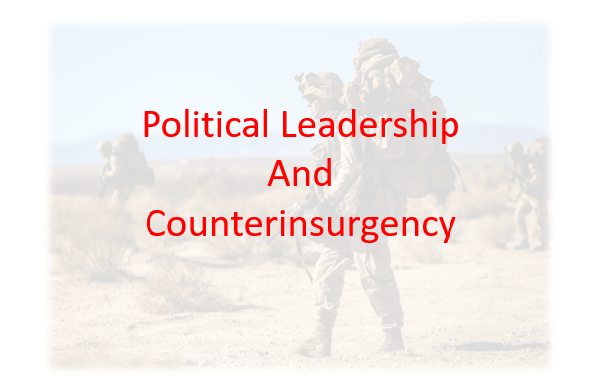
By Affan Burki.
Allied forces have utilised the decapitation of insurgent network leaders in its counterinsurgency campaigns in Afghanistan, Iraq, and around the world. However, this is why our COIN efforts have failed. Cutting the head off the snake just causes more heads to grow as junior, more ambitious members of organisations rise up in these decentralised insurgent groups. The new leaders are often far more violent and less reasonable than the ones we have deposed of. Our political leaders need to shift focus and become involved in the campaigns against insurgents and terrorists.
One of the most prominent of the COIN principles is ‘Primacy of Political Purpose’. Every other principle stems from this and / or is a deviation of this erstwhile COIN principle. The human terrain cannot be understood without understanding the political terrain; intelligence cannot be integrated unless it is analysed in a political context of affiliations and motives; the population cannot be made to feel secure by neutralising the insurgents without political backing; there is no strategic narrative unless it is initially spawned from a legitimate political authority. In turn, politics is all about gaining the support of the population using whatever legal means necessary, and then maintaining that support.
The reason we have failed to win these recent COIN campaigns is due to the lack of political contribution by our political masters. The diplomacy has been left to the soldiers, sailors, and airmen operating on the ground with minimal training for tasks that they are not designed nor suitably prepared for. Military troops are inherently trained to close in and destroy the enemy. The training that military personnel receive from Day 1 is to dehumanise the enemy, which makes it more palatable to destroy the enemy when required to do so. Although counterinsurgency retains the critical ability to destroy the enemy irreconcilables it also requires the same troops to apply a more dynamic application of this understanding. This is not the conventional role of military forces.
This is a completely different mindset to that required when working in a COIN campaign; one which requires the differentiation between non-combatants and combatants – both of these terms of identification being highly fluid and are subject to change in an instant. Counterinsurgents need to be prepared to respond to that fluid environment. Even SOF personnel, who are selected because of their ability to think outside of the box and to operate in more broad-scope operating environments, find it very difficult to be soldier-diplomats.
It is time for politicians, who sent us to fight COIN campaigns, to take responsibility for their (in)actions. They sent us to stabilise far-off lands without proper training, equipment and clearly defined strategic goals. More importantly, they failed to provide political support through training and operations. In short, military personnel have been set up for failure by our own political leadership. The COIN campaigns in Iraq and Afghanistan did not fail because of weaknesses in the conduct of operations using COIN principles; they failed because of a lack of political will and cohesion amongst the coalition.
The failure of the COIN campaigns in Iraq and Afghanistan have resulted in numerous civilian and military casualties on all sides. These casualties would have been minimised if the politicians within our home countries had taken a more active role in the leadership of these campaigns instead of leaving it to military troops to figure out a way of dealing with complex political problems. COIN Campaigns have not failed because of a lack of determination and desire to succeed by troops on the ground, they have failed because the political leadership failed to assume responsibility when it was most needed.
**********
Author: Affan Burki is a former British Army officer with a background in counterinsurgency. He has spent the vast majority of his career in the military as a teacher and planner for individual and collective training. Affan has spent the last 10 years focusing on Afghanistan, monitoring the political and military situation while contributing to military capacity building and security force assistance in the country. As a civilian, he is responsible for the design and delivery of training for multinational personnel working in Afghanistan and Iraq.